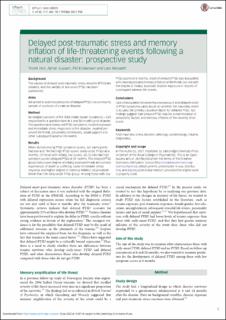Delayed post-traumatic stress and memory inflation of life-threatening events following a natural disaster: prospective study
Journal article, Peer reviewed
Published version

Åpne
Permanent lenke
https://hdl.handle.net/11250/2976073Utgivelsesdato
2021Metadata
Vis full innførselSamlinger
- Centre for Crisis Psychology [79]
- Registrations from Cristin [10399]
Sammendrag
Background
The causes of delayed post-traumatic stress disorder (PTSD) are debated, and the validity of late-onset PTSD has been questioned.
Aims
We aimed to examine predictors of delayed PTSD in a community sample of survivors of a natural disaster.
Method
Norwegian survivors of the 2004 Indian Ocean tsunami (n = 532) responded to a questionnaire at 6 and 24 months post-disaster. The questionnaire measured PTSD symptoms, recalled exposure and immediate stress responses to the disaster, recalled perceived life threat, personality dimensions, social support and other subsequent adverse life events.
Results
When dichotomising PTSD symptom scores, 331 participants had low and 194 had high PTSD scores (early-onset PTSD) at 6 months. Of those with initially low scores, 43 (13.0%) had high symptom scores (delayed PTSD) at 24 months. The delayed PTSD group had a lower degree of initially assessed threat and witness experiences of death or suffering, lower immediate stress response and higher degree of memory inflation of perceived threat than the early-onset PTSD group. Among those with low PTSD scores at 6 months, onset of delayed PTSD was associated with neuroticism and memory inflation of life threat, but not with the degree of initially assessed disaster exposure or reports of subsequent adverse life events.
Conclusions
Lack of association between trauma exposure and delayed onset of PTSD symptoms casts doubt on whether the traumatic event is actually the primary causative factor for delayed PTSD. Our findings suggest that delayed PTSD may be a manifestation of personality factors and memory inflation of the severity of an event.
